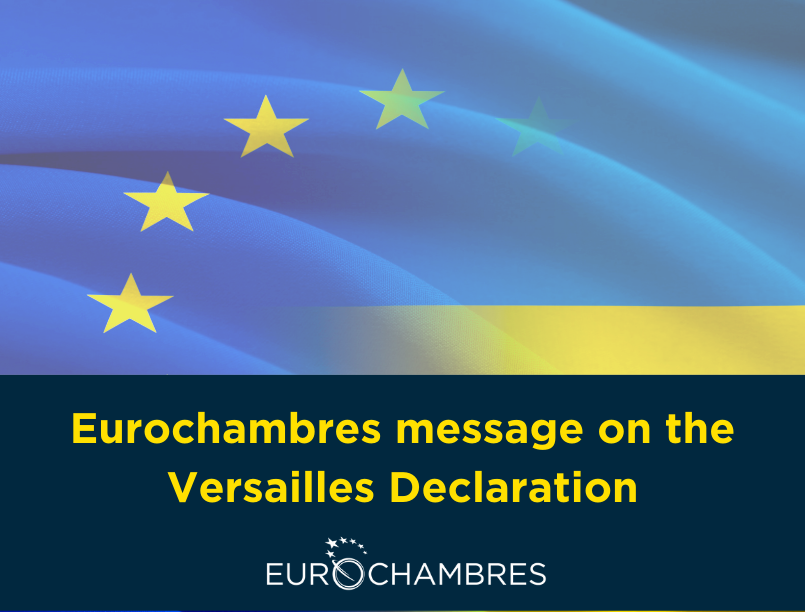Eurochambres’ message on the informal meeting of the European Council on the Versailles Declaration
Eurochambres welcomes the discussions at the informal meeting of the heads of state or government held yesterday and today and the “Versailles Declaration” adopted. This can and must act as a catalyst for the pursuit of an open, more resilient and diversified European economy that can respond to ongoing and potential future crises.
Beyond the ongoing humanitarian tragedy in Ukraine, Russia’s invasion represents a broader threat to European security and stability. The Informal European Council meeting in Versailles that concluded today provides a strong basis to address the short, medium and long term implications for the EU and the European economy.
Following the COVID-19 pandemic, the war in Ukraine and its widely resonating economic impact significantly emphasizes the need for Europe to enhance its supply chain security and to reduce and mitigate strategic vulnerabilities. We must strengthen the EU’s competitive base, both within the single market and with key third country partners. A strong EU trade policy that opens new doors, reduces and eliminates trade barriers and improves global trade rules is more important than ever. The Versailles meeting should trigger the ratification and conclusion of key EU trade agreements. We also welcome the proposals to reform and simplify authorisation of investment projects in the EU, to create a streamlined and predictable regulatory environment, to promote skills and, fundamentally to complete the single market.
In such a difficult high-price situation, consumers and businesses must be adequately supported, which necessitates sufficient stores of natural gas by next winter. In the short-term, the EU’s strategy of diversifying energy suppliers as quickly as possible, particularly with liquified natural gas deliveries from the US and the Middle-East, is very welcome. We must ensure that there is enough energy for consumers and businesses at reasonable prices, not least to prevent businesses from temporarily shutting down.
To meet our common climate and energy goals, we must strengthen the European energy system, increase its resilience and interconnection, improve energy system integration and significantly increase and accelerate the permitting and deployment of renewable energy installations. In the medium- to long-term, this will be the most important way to achieve greater energy independence and have sufficient and affordable green energy available. This must be accompanied by the swift establishment of any missing interconnections between EU countries. The business community also welcomes the increased recognition of the importance of further and faster development of biogas and hydrogen markets and quantities.
Energy policies, which are currently being negotiated as part of the Fitfor55 package, must make realistic assumptions about timelines and feasibility in order to avoid disruption and worrying knock-on effects for the entire economy. The development of new international energy cooperation projects and energy partnerships should be prioritised. Such projects must also be adequately funded and administratively accessible.
Eurochambres expressed its support for measures taken by the EU in response to Russia’s military aggression in a statement on 25 February. The socio-economic ripple effect of sanctions will, though, be felt across Europe and this of course comes after two very tough years. Just as the EU responded to the pandemic with short-term initiatives and then the NextGenerationEU, so must we develop a plan to shield European businesses from the impact of the unprecedented package of measures taken against Russia.
The EU has acted decisively since the Russian aggression escalated in late February. This approach must continue if we are to provide effective support to Ukraine in its hour of need and also if we are to be able to deal with future threats to Europe’s stability, security and prosperity.
